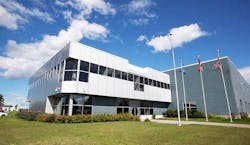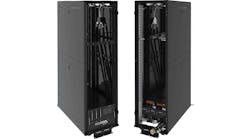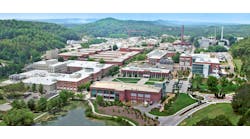Data center provider Cologix will acquire Montreal-based hyperscale specialist COLO-D in a deal that deepens its offerings in a key market. The acquisition continues the evolution of Cologix, which is seeking to grow beyond its core business of colocation and interconnection services in regional hubs, and offer larger footprints in hyperscale markets.
Buying COLO-D adds 50 megawatts of wholesale data center capacity in the Montreal market, where Cologix already dominates the interconnection business, with seven facilities throughout the region. The deal also caps a big week for Montreal, following on the heels of Vantage Data Centers’ $200 million acquisition of 4Degrees Colocation on Tuesday.
The transaction underscores the importance of connectivity in the fast-growing hyperscale data center business, as interconnection facilities provide ready access to cloud platforms in wholesale data centers.
“The COLO-D acquisition is representative of our investment and commitment to offering tethered hyperscale data centers in order to meet and exceed the needs of the rapidly growing hyperscale edge and cloud connectivity markets,” said Bill Fathers, Chairman and CEO of Cologix. “COLO-D and Cologix combine the necessary physical infrastructure with the cloud and network on-ramps to a robust connectivity ecosystem that hyperscalers require.”
Why Hyperscalers Love Montreal
COLO-D is part of a growing data center industry in Montreal. Cologix has long been the leading multi-tenant operator in Montreal, and in recent years it has been joined by a group of wholesale data center specialists, including COLO-D and ROOT Data Center, which have won deals with larger hyperscale customers. Recent additions include eStruxture, which has acquired several established providers in the Montreal market, and now Vantage.
Hyperscale players have focused on Montreal due to abundant hydro power from local utility Hydro Quebec, which is available at far cheaper prices than options in Toronto. Both Google and Amazon Web Services have opened cloud regions in Montreal in recent years.
With the COLO-D acquisition, Cologix says it will deploy $500 million in data infrastructure investment across its Montreal footprint by the end of 2019 including a 3 megawatt expansion in its downtown MTL7 data center. Collectively the companies now offer choice of 80+ networks and direct on-ramps to the leading clouds services, including Amazon Web Services, Microsoft Azure, Google Cloud Platform and IBM Cloud.
The two companies said the deal offers the opportunity for COLO-D the opportunity to grow further in Montrea,l and perhaps bring its large-footprint designs to new markets.
“Montréal represents a fast growing and increasingly strategic market that has already attracted the biggest cloud platforms in the world, with an abundance of very low cost power derived from renewable energy sources,” said Patrick David, President and CEO of COLO-D. “Cologix has continually demonstrated an unmatched commitment to the needs of the region in terms of data center capacity, resources and infrastructure, and we’re pleased to now be part of their team. The combination with Cologix will further strengthen COLO-D’s market position and allows us accelerate our growth in this market and beyond.”
Cologix Thinking Bigger
After years as a regional colocation specialist, Cologix is seeking a higher profile in the North American market for interconnection services. With the support of its new ownership, Cologix is building bigger data centers, eyeing new markets, and positioning itself as a key provider of on-ramps to major clouds.
Private equity firm Stonepeak Infrastructure Partners acquired Cologix in early 2017, calling it “a marquee platform to enter the data center and interconnection market in North America.” and pledging to invest $500 million in the company’s growth.
A first step was the company’s entry into the Northern Virginia market with the purchase of a property in Ashburn.
Although it has facilities in several major markets, including Dallas and northern New Jersey, Cologix is notable for its focus on creating interconnection facilities in regional markets, with data centers in Minneapolis, Jacksonville, Lakeland, Fla. and Columbus, Ohio in the U.S. and Canadian sites in Montreal, Toronto and Vancouver.
Another element of Cologix’ growth strategy is building larger data centers – an emphasis that will be supported by its purchase of COLO-D, which has existing 20 megawatt and 35 megawatt facilities. The acquisition includes land parcels that can support an additional 180 megawatts of capacity.
Dark Fiber And Hyperscale Development
Fathers said the integration with COLO-D in the Montreal market will showcase a connectivity-focused strategy that will play an important growing role in the Cologix playbook going forward. Hyperscale customers are approaching “tethering” – connecting suburban wholesale data center facilities with downtown interconnection facilties – in a slightly different fashion, Fathers said. Rather than seeking lit circuits, these large customers want redundant dark fiber routes, not just diversity but “tri-versity,” according to Fathers.
In Montreal, COLO-D has several hyperscale players using its campuses. Cologix has laid dark fiber between its downtown colocation operations and the COLO-D facilities, providing flexibility for customers to implement their network designs.
Rather than relying on redundant layers of power and cooling equipment, cloud players use their network to route around outages. This approach requires lots of data capacity, and backup options for the network rather than UPS and generators.
“They all put more emphasis on resiliency from the network rather than the data center,” said Fathers. “They assume there’s going to be failure, and need two or three fiber paths to move enormous amounts of data. They’ve hit the economy of scale where it makes sense for them to do their own optics.”
Fathers said this is a trend Stonepeak identified through its ownership of euNetworks, a bandwidth infrastructure company in Western Europe. “We’re all over this topic of owning the fiber loops,” said Fathers. “We see this as an opportunity to get into that market.”






